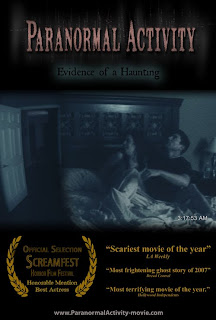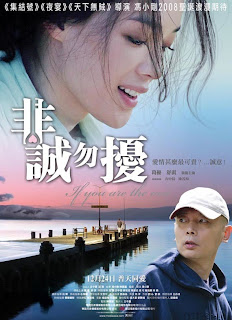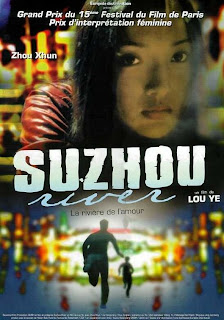The crucial part of a scene where an axe is planted into someone’s head is not how it goes in but how it comes out. This is where a director lets you in on what they’re doing, what kind of film they’re making and how good their chops are. You might think just based on the fact that we have an axe planted in someone’s head that it tells you all you need to know about what kind of movie we’re talking about, and you’d be right, up to a point. Billed as a serial killer thriller, this year’s
Missing (Sil Jong [literally, The Disappeared]), by Korean director
Kim Sung-Hong—not to be confused with
Hark Tsui’s
Missing (Sam hoi tsam yan) from last year—is a slasher movie, but it’s not. It’s got all the ingredients of a
Friday the 13th—not a
Hostel—style gorefest but seems to be targeting an older, if not wiser, demographic. I’m a bit surprised to read that this film has done reasonably well at the box office bringing in three and a half million since it’s debut March 19.
Missing is based on a true story. In August and September of 2007, a seventy year old South Korean fisherman killed four women in Bosung, South Jeolla Province, South Korea. All the publicity for the film lets us know that it’s been fictionalized but I don’t know if that is referring to the axe implantations, and other acts of that ilk, or the fact that the killer in the film is a sixty year old ex-restauranteur cum chicken farmer. Wikipedia doesn’t have an entry for the guy so we’ll have to wait to find out the facts.
South Korea’s done pretty well with serial killer films based on true events.
Memories of Murder and
The Chaser come to mind.
Missing isn’t up to the caliber of those films, but it doesn’t try to be like them either. It’s not played from the point of view of a cop, or ex-cop’s, investigation. It’s a bit more simply voyeuristic. The first act observes the plight of one of the victims along with some collateral damage. It’s got a gratuitous up-skirt shot, cameras that pan out from a girl’s behind, a “Women in Prison” style shower scene, something somewhere between
Deliverance and
Last Tango in Paris, and an attempt at some
Lorena Bobbitt flavored revenge. When you add all that up you should get something a lot less than what
Missing ends up being. There is nothing remarkable about the style of the film but the production values are what you’d expect from a mainstream South Korean offering. It gives us exploitation within a mainstream frame.
Along with the cheap thrills of a crap horror movie we also get many more earmarks of the genre: an almost discovery that comes too early in the film; a freak accident that kicks the film into third gear; cops who refuse to help because there’s insufficient evidence to do so; and above all, characters who don’t act the way they should, like not running away or successfully killing the bad guy when it seems they have the chance, not to mention an ending that’s tackily tacked on in order to have a sequel. (I don’t think it’s just a nod to the real thing)
Missing is the most un-Korean Korean film I think I’ve seen. It’s like a Hollywood film, only better. Watching it, I wasn’t thinking it would be ripe for a Hollywood remake. I was trying to figure out what Hollywood movie it was a remake of. So much of it is so familiar. It doesn’t reach for the epic proportions of a
Se7en or a
Silence of the Lambs, nor does it have any of the new wave stylings of the French extremists, but it also doesn’t sink to the depths of a standard Hollywood slasher. It’s not a great film, maybe not even a good one, but it’s pretty good at being unlike what it seems to be. It should mildly satisfy gore hounds and horror enthusiasts while not completely turning off those who, if you were to mention something like a
Fargo moment, might be prone to immediate dismissal.
The film is well cast too. Veteran actor
Moon Seong-geun (
Virgin Stripped Bare by Her Bachelors,
Green Fish) plays the old man killer as utterly normal and utterly evil.
Jeon Se-hong (
Temptation of Eve) is sufficiently bodacious as the younger sister and first victim put through the grinder, so to speak, and
Chu Ja-hyeon (
Portrait of Beauty,
Bloody Tie) plays the older sister who goes looking for her with enough intelligence and good looks to keep us on board for the duration. And there’s motorbike riding coffee delivery girls in hot pants. But don’t think you have this film figured out. It might surprise you. There will be blood.
★★★★
 Another film by Akihiko Shiota, director of Harmful Insect. It had some moments but nothing special for me. I'm not sure what to think of Shiota at this point. I appreciate what he is trying to explore: disaffected, abused and neglected youth and all that, but I'm not convinced he's good at it yet. Harmful Insect would have been a lot less interesting without Aoi Miyazaki. I think Mitsuki Tanimura does a good job in Canary, Hoshi Ishida not so much but his character was the brooding, doesn't-say-much type, which is difficult for a teenager to pull off (unless you're Aoi Miyazaki).
Another film by Akihiko Shiota, director of Harmful Insect. It had some moments but nothing special for me. I'm not sure what to think of Shiota at this point. I appreciate what he is trying to explore: disaffected, abused and neglected youth and all that, but I'm not convinced he's good at it yet. Harmful Insect would have been a lot less interesting without Aoi Miyazaki. I think Mitsuki Tanimura does a good job in Canary, Hoshi Ishida not so much but his character was the brooding, doesn't-say-much type, which is difficult for a teenager to pull off (unless you're Aoi Miyazaki).




































